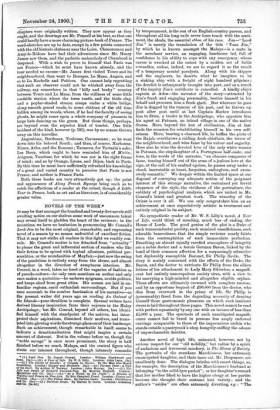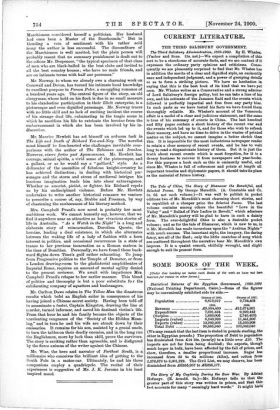NOVELS OF THE WEEK.*
IT may be that amongst the hundred and twenty-five novels still awaiting notice on our shelves some work of uncommon talent may reveal itself to gladden the heart of the reviewer; in the meantime, we have no hesitation in pronouncing Mr. Conrad's Lord Jim to be the most original, remarkable, and engrossing novel of a season by no means unfruitful of excellent fiction. That it may not strike all readers in this light we readily con- cede. Mr. Conrad's matter is too detached from " actuality " to please the great and influential section of readers who like their fiction to be spiced with topical allusions, political per- sonalities, or the mundanities of Mayfair,—just now the swing of the pendulum is entirely away from the slums, and almost altogether in the direction of sumptuous interiors. Mr. Conrad, in a word, takes no heed of the vagaries of fashion or of pseudo-culture—he only once mentions an author and only once makes a quotation—he eschews epigrams, avoids politics, and keeps aloof from great cities. His scenes are laid in un- familiar regions, amid outlandish surroundings. But if you once succumb to the sombre fascination of his narrative—as the present writer did years ago on reading An Outcast of the falands—yourthraldom is complete. Several writers have derived literary inspiration from their sojourn in the Malay Archipelago; but Mr: Conrad, beyond all others, has identi- fied himself with the standpoint of the natives, has inter- preted their aspirations, illumined their motives, and trans- lated into glowing words the strange glamour of their landscape. Such an achievement, though remarkable in itself, seems to indicate a denationalisation that might inspire a certain amount of distrust. But in the volume before us, though the "noble savage" is once more prominent, the story is half finished before we reach Malaya, and the central figure who rivets our interest throughout, though intensely romantic • (1.) Lord Tim. By Joseph Conrad. London : William Blackwood and Sons. [6s.]—(2.) A Year of Life. By W. S. Lilly. London: John Lane. [68.) —(3.) The Slaves of Society: a Comedy in Covers. By the Man who Heard Something. London : Harper and Brothers. 164.]—(4.) Parson Peter : a Tale of the Dart. By Arthur IL Norway. London : John Murray. I ea.)—(15.) Inc Life and Death of Richard Yea-and-Nay. By Maurice Hewlett. London : Macmillan and Co. [6a1—(6.) "As a Watch in the Artght": a Drama of Waking and Dream in Five Acts. By Mn.. Campbell Praed. London : Chatto and Windy& Les.1—(7.) The Talon Nan. By Carlton Dawe. London : Hutchinson
Co. Farthest South. By Harold E. Gorst. London : Greening and [28.6d.1
by temperament, is the son of an English country parson, and throughout all his long exile never loses touch with the senti- ment, the ideals, the essential ethos, of his race. Jim—" Lord Jim" is merely the translation of the title " Tuan Jim," by which he is known amongst the Malays—is a mate in the merchant service, an engaging, handsome lad, full of confidence in his ability to cope with any emergency, whose career is wrecked at the outset by a sudden act of futile cowardice, unless, indeed, we are to regard it as the result of a temporary mental paralysis. Along with his skipper and the engineers, he deserts what he imagines to be a sinking ship with a freight of eight hundred pilgrims ; the derelict is subsequently brought into port, and as a result of the inquiry Jim's certificate is cancelled. A kindly ship's captain at Aden—the narrator of the story—attracted by Jim's frank and engaging personality, bestirs himself in his behalf and procures him a fresh start. But wherever he goes Jim is dogged by the rumour of .his past, and he throws up post after post until at last Captain Marlow introduces him to Stein, a trader in the Archipelago, who appoints him his agent at Patusan, an inland village in one of the native States. Here, beyond the ken of civilisation, Jim at last finds the occasion for rehabilitating himself in his own self- esteem. Here,' bearing a charmed life, he baffles the plots of the Rajah, overthrows a raiding Arab chieftain, the terror of the neighbourhood, and wins fame by his valour and sagacity. Here also he wins the devoted love of the only white woman in Patusan, the stepdaughter of a Portuguese half-caste, and here, in the words of the narrator, "an obscure conqueror of fame, tearing himself out of the arms of a jealous love at the sign, at the call of his exalted egoism, he passes away under a cloud, inscrutable at heart, forgotten, unforgiven, and exces- sively romantic." We despair within the limited space at our disposal of conveying any adequate notion of the poignant interest of this strange narrative, the restrained yet fervid eloquence of the style, the vividness of the portraiture, the subtlety of psychological analysis, which are united in Mr. Conrad's latest and greatest work. The wizardry of the Orient is over it all. We can only congratulate him on an achievement at once superlatively artistic in treatment and entirely original in its subject.
No sympathetic reader of Mr. W. S. Lilly's novel, A Year of Life, could think of mending, much less of ending, the House of Lords. The good genius of the plot is a Duke of such transcendental probity, such unmixed unselfishness, such adorable benevolence, that the simple reviewer nearly faints from the contemplation of such immaculate perfection. Breathing an almost equally rarefied atmosphere of integrity are a noble doctor and a heroic German Baron, linked by the bond of their common affection for a, surpassingly attractive but deplorably susceptible Baronet, Sir Philip Savile. The story is mainly concerned with the efforts of the Duke, the Baron, and the doctor to extricate Sir Philip from the silken fetters of his attachment to Lady Mary Silverton, a magnifi- cent but entirely unscrupulous society siren, with a view to his marrying a high-minded and altogether eligible orphan. These efforts are ultimately crowned with complete success, and by an opportune bequest of 290,000 from the doctor, who dies from overwork in the prime •of life, Sir Philip is (presumably) freed from the degrading necessity of denying himself those gastronomic pleasures on which such insistent stress is laid throughout these pages. This novel cannot be read with perfect equanimity by any one with an income of less than 25,000 a year. The spectacle of such unmitigated magnifi- cence cannot fail to breed in persons less amply endowed cravings comparable to those of the impecunious urchin who stands outside a pastrycook's shop hungrily sniffing the odours of unpurchaseable dainties.
Another novel of high life, animated, however, not by serious respect for our "old, nobility," but rather by a spirit of audacious and irreverent mockery, is The Slaves of Society The portraits of the mundane Marchioness, her extremely emancipated daughter, and their tame cat, Mr. Despencer, are excellently done. The dialogue bristles with smart things, as, for example, the description of the Marchioness's husband as belonging "to the solid-tyre period"; or her daughter's remark that her mother liked to have the higher clergy at her parties because she thought their costume lent variety ; and the author's " asides " are often extremely diverting, e.g. : "The
Marchioness considered herself a politician. Her husband had once been a Master of the Deerhounds." But in blending a vein of sentiment with his rather acid irony the author is leas successful. The discomfiture of the Marchioness is well merited, but the plain person will probably resent that no summary punishment is dealt out to the odious Mr. Despencer, "the typical specimen of that class of men who are black-balled in the best clubs and invited to all the best country houses ; who have no male friends, and are on intimate terms with half our peeresses."
Mr. Norway, to whom we already owe a charming work on Cornwall and Devon, has turned his intimate local knowledge to excellent purpose in Parson Peter, a smuggling romance of a hundred years ago. The central figure of the story, an old clergyman, whose hold on his flock is due in no small measure to his clandestine participation in their illicit enterprise, is a picturesque and even dignified personage. Mr. Norway traces with no little skill and no lack of exciting incident the course of his strange dual life, culminating in the tragic scene in which he sacrifices his life to extricate the heroine from the embarrassment in which she has been involved by his in- discretion.
Mr. Maurice Hewlett has set himself an arduous task in The Life and Death of Richard Yea-and-Nay. The novelist must himself be lion-hearted who challenges inevitable com- parisons with the author of The Talisman and Ivanhoe. However, vizere fortes post Agamemnona. Mr. Hewlett has courage, animal spirits, a vivid sense of the picturesque, and a gallant, or as he would say a " galliard," style. As a delineator of the amenities of fabulous knight-errantry he has achieved distinction ; in dealing with historical per- sonages and the storm and stress of medimval intrigue his luscious imagination leads him into sheer extravagance. Whether as amorist, pietist, or fighter, his Richard repels us by his undisciplined violence. Before Mr. Hewlett undertakes to write another historical romance we venture to prescribe a course of, say, Stubbs and Freeman, by way of chastening the exuberances of his literary method.
Mrs. Campbell Praed's new novel is probably her most ambitious work. We cannot honestly say, however, that we find it anywhere near as attractive as her vivacious stories of life in Australia. "As a Watch in the Night" is a long and elaborate story of reincarnation, Dorothea Queste, the heroine, leading a dual existence, in which she alternates between the waking life of a lady of fashion with a keen interest in politics, and occasional recurrences in a state of trance to her previous incarnation as a Roman matron in the time of Domitian. Personally, we have found these back- ward flights down Time's gulf rather exhausting. To jump from Progressive politics to the Temple of Demeter, or from a London drawing-room to the gladiatorial amphitheatre of Imperial Rome, requires an amount of mental agility denied to the present reviewer. We await with impatience Mrs. Campbell Praed's relapse to her earlier manner. This blend of politics and theosophy is but a poor substitute for the exhilarating company of squatters and bushrangers.
Mr. Carlton Dawe relates in The Yellow Man the disastrous results which befel an English sailor in consequence of his having joined a Chinese secret society. Having been told off to assassinate a taotai, Captain Kingston, drawing the line at murder, turned informer, and saved his destined victim's life. From that hour he and his family became the objects of the unrelenting vengeance of the "Society of the Hidden Mean- ing," and in turn he and his wife are struck down by their emissaries. It remains for his son, assisted by a genial uncle, to turn the tables on their deadly enemies, and in the long run the Englishmen, more by luck than skill, prove the survivors. The story is exciting rather than agreeable, and is disfigured by the fierce animus of the writer against the Chinese.
Mr. Wise, the hero and narrator of Farthest South, is a millionaire who conceives the brilliant idea of getting to the South Pole in a motor-car. Intimately, he and his three companions employ a quadricycle. The recital of their experiences is suggestive of Mr. J. K. Jerome in his least inspired mood.











































 Previous page
Previous page